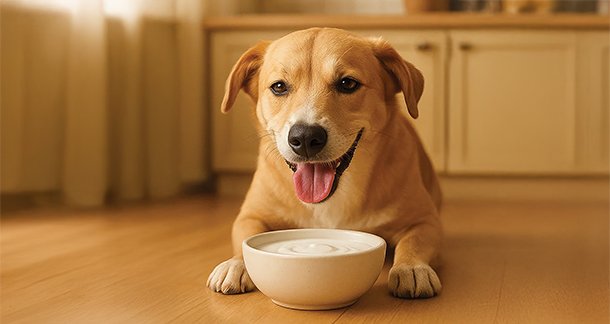Milk and dogs might seem like a harmless combo, but for many pups, it can turn into a tummy trouble story. While we humans enjoy milk every day, when it comes to our furry friends, the question ‘Is milk safe for dogs?’ still sparks debate among pet parents and vets alike.
Problems with Milk Consumption in Dogs
Many dogs are lactose intolerant because their bodies do not make enough lactase, the enzyme needed to digest lactose which is the natural sugar in milk. When this happens, even a small amount of milk can upset their stomach and lead to diarrhea, vomiting, gas, or discomfort. The reaction can be different for every dog, with some showing only mild signs while others feel very sick after drinking milk.
Causes of Lactose Intolerance in Dogs
- Lactase deficiency: Dogs naturally produce lactase enzyme in puppyhood for digesting mother’s milk, but this production decreases as they mature.
- Breed variations: Some breeds might be more prone to lactose intolerance than others.
- Individual tolerance: Dogs have varying levels of tolerance to lactose.
Symptoms of Milk Consumption in Dogs
- Diarrhea
- Vomiting
- Gas and bloating
- Abdominal pain or discomfort
Dairy Products for Pets
Not all dairy products are created equal when it comes to canine consumption. Some options might be more tolerable or beneficial than plain cow’s milk.
- Goat Milk: Goat milk is often considered a more digestible alternative to cow’s milk for dogs. It has smaller fat molecules and different protein structures that might be easier for some dogs to digest.
- Yogurt: Plain, unsweetened yogurt containing probiotics can be beneficial for dogs in moderation, supporting gut health.
- Cheese: Some dogs tolerate small amounts of cheese, but it’s high in fat and calories.

Goat Milk Benefits for Pets
- Easier Digestion – Smaller fat globules and unique protein structure make it gentler on sensitive stomachs.
- Nutrient-Rich – Packed with high-quality proteins, essential vitamins, and minerals that support overall health.
- Gut-Friendly – Natural probiotics help maintain a healthy gut microbiome and improve digestion.
- Immune Support – Contains immunoglobulins that can strengthen the body’s natural defenses.
- Globally Trusted – Widely used in pet food formulations worldwide, proving its nutritional value.
- Great for Sensitive Dogs – A safe alternative for pups who cannot tolerate cow’s milk.
Considerations
- Moderation is key: Even if goat milk is considered, it should be given in moderation and as part of a balanced diet.
- Individual tolerance: Monitor dogs for signs of intolerance or allergy.
- Consult a veterinarian: Before making significant changes to a dog’s diet, consult with a veterinarian to ensure nutritional balance and suitability for the individual pet.
Conclusion
While dogs can have issues with lactose in milk, certain dairy products like goat milk might offer alternatives with potential benefits when given appropriately. Understanding a dog’s individual tolerance and consulting with veterinary professionals are crucial steps in incorporating any dairy product into a pet’s diet.

Global Perspectives and Research
Research on goat milk in pet nutrition highlights its potential as a nutritious ingredient. Studies suggest goat milk’s composition and digestibility could make it a valuable component in pet foods for animals with specific dietary needs.
Final Thoughts
Pet owners should approach milk and dairy products with caution, prioritizing their dog’s individual health needs and tolerances. Goat milk represents one potential option among dairy products that might suit some dogs, emphasizing the importance of tailored dietary choices under veterinary guidance.
With its blend of nutrients and potential digestibility advantages, goat milk is an ingredient gaining attention in discussions about pet nutrition, reflecting broader interests in optimizing diets for companion animals worldwide

